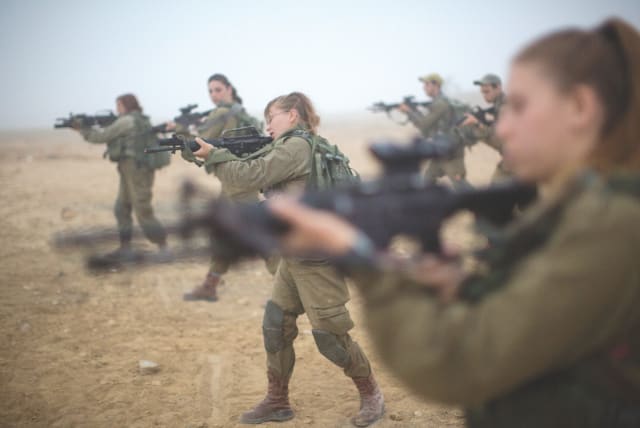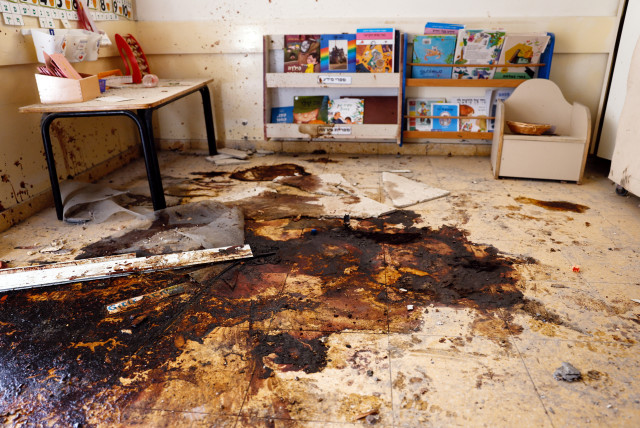The anti-Zionist sex: Feminist organizations side with Hamas

The October 7 massacre brought feminist organizations and jihadist rapists into one bed.
"Simone thinks like a man!” said Simone de Beauvoir’s father, having not the faintest idea that the schoolgirl he adored would become the big prophetess of the feminist idea.
De Beauvoir’s magnum opus, The Second Sex (1949), showed how women were relegated by men to society’s margins through myth, law, and convention, beginning with the biblical laws of purity and Greek mathematician Pythagoras’s claim that life is split into two principles: The good principle, which created order, light and man; and the bad principle, which created chaos, darkness, and woman.
Having defied all theories and prejudices about women’s inferiority, and while at it mapped, decried, and ridiculed women’s historic discrimination, the book became the Bible of the soon-to-erupt feminist movement, and a pillar of postwar liberalism.
Now, the October 7 massacre’s reverberations are lending new relevance to de Beauvoir’s legacy, albeit in improbable ways, making strange bedfellows of her gospel’s most vocal believers and most obvious apostates.
Israeli women vindicate de Beauvoir's theory
IT WAS but a detail in that dreadful day’s broader picture, but the fact is that on October 7 Israeli women vindicated de Beauvoir’s theory in particularly stark ways.
One woman, 25-year-old Inbal Lieberman, headed the emergency squad in Kibbutz Nir Am, tucked outside the Gaza Strip’s northeastern tip.
Inbal’s heroism surfaced twice. First, when the rocket salvos began, she collected her 12-person squad, positioned some of them along the kibbutz fence and the rest in ambushes between them, sensing that something big was about to happen, even though she received no order, or even a briefing, about an impending attack.
That was at 6:30 a.m. Then the terrorists arrived, some 25 of them, and Inbal found herself commanding a gunfight. For three hours she and her squad exchanged fire with the assailants, killing two and wounding a third, until IDF troops arrived and stormed the terrorists who surrounded the kibbutz.
By day’s end, it turned out that in Kibbutz Nir Am, where Inbal was born and raised, no one was killed, wounded, or taken hostage, thanks to her resilience, leadership, and guts.
Meanwhile, beyond the Gaza Strip’s opposite end, Captain Karni (family name withheld) was told to rush tanks north, from the Egyptian border toward the Strip.
The squadron she led had entered Route 232 when they encountered dozens of terrorists. From atop her tank, another officer, Lt. Michal, had the closer assailants machine-gunned down and the farther ones targeted by the cannon while her colleague, Sgt. Tal, operated the radio.
Having killed dozens of men and then been joined by another tank, the women thought the fighting had ended, but then they reached Kibbutz Holit, where a soldier walking toward the turret told them that a battle was raging inside the kibbutz.
Cpt. Karni had the Merkava ram forward through the kibbutz’s locked gate and the terrorists who crowded around it. Then she battled more terrorists with her two crews in the groves abutting the kibbutz while joining the fighting between the houses and the evacuation of the casualties across the kibbutz’s bloodstained lawns.
Inbal, Karni, Tal, and the rest of the women who fought heroically on October 7 are everything de Beauvoir argued a woman can be, if only given a chance: assertive, resourceful, cool, and brave. Israel’s women fighters put to shame the chauvinists who, in their effort to thwart women’s military service, claimed women are not built to fight wars, and men are.Women’s liberation has been part of the Zionist ideal since its inception. The Zionist movement gave women the right to vote already in 1897, decades before many Western countries, and Israel was the first Western country to be led by a woman. Our female warriors are this legacy’s natural continuation.
That’s a lot more than can be said of major Western feminist groups, whose response to the October 7 massacre’s trampling of feminism’s very foundations has been anything but natural.AS IRONIES go, the terrorists whom Israel’s women warriors killed were the quintessential representatives of the chauvinism that de Beauvoir decried and the feminist movement abhors. On the battlefield, Hamas deployed rapists; off the battlefield, it keeps women physically veiled, economically shackled, and socially chained, besides subjecting them to polygamy and exposing them to so-called honor killings.
You’d think, then, that feminist organizations worldwide, faced with the October 7 accounts of multiple Israeli women’s individual rape, gang rape, and murder during rape, would take the side of justice and cry out in the name of women’s honor, safety, and pride. That’s not what happened.
UN Women, the United Nations’s women’s rights agency, said in a formal communique after the atrocities: “UN Women condemns the attacks on civilians in Israel and the Occupied Palestinian Territories and is deeply alarmed by the devastating impact on civilians, including women and girls.”
Hamas, one would think, does not exist, and whatever it is that happened to women last month on the battlefield’s one side, happened on the other side as well. And to twist the knife in any feminist’s back, the statement concluded with a cynical reminder that the “International Humanitarian Law and Human Rights Law must be respected and upheld.”
Expecting truth, justice, and impartiality – not to mention courage – from that UN office would be rich. But what about America’s feminist flagships, outfits like the Washington-based National Organization for Women, the Women for Women International, or the Toronto-based Association for Women’s Rights in Development? Why don’t they speak up for the women Hamas dishonored, disfigured, and defaced?
How can such feminist batteries not confront a bulwark of misogyny like Gaza’s Islamist regime? Can it be that these self-styled feminist crusaders lack the feminine courage that Simone de Beauvoir inspired while defending women’s honor, and Inbal Lieberman displayed while defending her home?
www.MiddleIsrael.netThe writer, a Hartman Institute fellow, is the author of the bestselling Mitzad Ha’ivelet Ha’yehudi (The Jewish March of Folly, Yediot Sefarim, 2019), a revisionist history of the Jewish people’s political leadership.
Jerusalem Post Store
`; document.getElementById("linkPremium").innerHTML = cont; var divWithLink = document.getElementById("premium-link"); if (divWithLink !== null && divWithLink !== 'undefined') { divWithLink.style.border = "solid 1px #cb0f3e"; divWithLink.style.textAlign = "center"; divWithLink.style.marginBottom = "15px"; divWithLink.style.marginTop = "15px"; divWithLink.style.width = "100%"; divWithLink.style.backgroundColor = "#122952"; divWithLink.style.color = "#ffffff"; divWithLink.style.lineHeight = "1.5"; } } (function (v, i) { });

